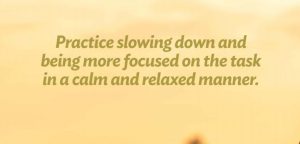How to Know Your Signs of Stress
“The 7 Warning Signs of Stress”
By James C. Petersen, PhD
*This is an article from the Summer 2021 issue of Contentment Magazine.
When we don’t feel well, we go through a battery of medical tests to determine what is wrong, and then the doctor prescribes treatment for us. When our car does not start, the mechanic plugs the car’s “brain” into their computer and runs some diagnostic tests so he can tell us what is wrong. When we know the problem, we get it fixed. A financial planner first evaluates our wealth, desires, and risk tolerance, and then provides a financial plan for investing. However, in the world of understanding stress, assessing one’s stress is a lot different from fixing a car or going to the doctor.
Knowing what to change is the first step to mastering stress. Yet, determining what to change to master stress is difficult. In effect, it requires making an objective judgment about oneself, the cause of our stress, and what to change to make things better. People are not objective beings; we are highly subjective and often cannot decern what to change, let alone how.
The fact is, most of us know when we are stressed. We might complain about how stressful our life is or notice that our body, through aches and pains, is telegraphing that something is not right, or that we are sleeping poorly and waking up feeling unrested. But knowing why our stress is occurring and what to change is not the same as feeling and experiencing stress.
When stressed, our behaviors, attitudes, and inner thoughts change dramatically. Stress warning signs vary widely from person to person. Some people express stress outwardly through anger, irritation, impatience, and hostility. In contrast, others turn inward and become self-critical with thoughts of disappointment, feeling burned-out, or being physically and emotionally tense. No one reacts precisely the same way when confronted by life’s stressors and problems. This makes identifying our stress warning signs all the more difficult.
One of the main challenges in identifying stress warning signs is that we are very adaptable and can live and work under enormous stress. Because we unconsciously adapt to high levels of stress, we tune it out, ignore it and even accept it as part of our life and work. Psychologists call this the Adaptation-level Principle,1 which means that people tend to adapt to higher and higher levels of stress until that level becomes the “new normal.” Once that level is accepted, then a new level is needed, and another “new normal” is established.
Assess Before Change
One of the most effective ways to recognize our personal stress warning signs is to take a structured stress assessment, carefully researched and validated to measure critical aspects of stress. One such tool is the Stress Mastery Questionnaire (SMQ). I created the SMQ to help clients in my Biofeedback and Stress Management Clinic become more aware of their stress warning signs. This enables them to begin the process of learning the causes of their stress and what to do about it. Over the past 30 years, over 600,000 people have taken the SMQ, intending to understand themselves and their stress better.
The SMQ was created using standard psychometric test development techniques and has been validated through a research grant from the National Institute of Occupational Safety and Health (CDC/NIOSH). It is a norm-based assessment, so scores are compared to the norm group to provide a frame of reference. The SMQ is Certified by the American Institute of Stress (AIS).
The SMQ is grounded on the pioneering work of stress research pioneers like Hans Selye,2 Herbert Benson,3 Freidman and Rosenman4 (Type-A Personality), and many others. The SMQ is not a quiz, nor is it a psychological test; it is a self-report inventory based on how an individual answered 87 scientifically developed questions relating to stress. After completing the SMQ, each person receives a detailed Stress Mastery Report showing his or her “risk” scores on each scale. The SMQ is designed to focus on three essential stress areas:
- Stress Warning Signs (7 scales)
- Stressors (2 scales)
- Stress Effects (2 scales)
In all, 11 separate scales provide a view into the behaviors, attitudes, and physical issues related to stress. Armed with this information, one can begin to focus on specific areas to change so that stress can be managed and mastered. The next step is to…
Know What to Change
7 SMQ Stress Warning Signs
When reviewing each scale, take a moment to think about how you might score on that scale. Ask, does this stress warning sign have meaning for me? If so, what can I do to change my thinking, behaviors, or attitudes to reduce and prevent stress from impacting me? If it resonates with you, take action.
Anger
The first SMQ warning sign is anger. Anger is the outward expression of inner stress and is potentially one of the most damaging emotions. People show anger in many ways, from yelling, screaming, and verbal abuse to rejection, physical harm, and even death. The SMQ Anger scale provides information about how frequently anger is expressed when expectations and hopes are not being met. Core components of anger are irritability, frustration, impatience, and dissatisfaction with others or events. Fear of loss of control drives people to use anger to get what they want and expect. Focus on changing expectations, setting realistic expectations, and learning to “let go” when things do not go as hoped for help reduce the amount of anger and stress experienced.

Perfectionism
Perfectionism is a traditional Type A concept and can be described as the need to think and behave in exacting and demanding ways toward self or others. Perfectionists are often intolerant of anyone not meeting their high standards, and they become irritated and upset when people make mistakes and fail to live up to their expectations. Perfectionism is not the same as the quest for excellence, which is a positive and constructive approach to life and work. Individuals exhibiting a high degree of perfectionism often have chronic health, physical and emotional problems. Driven by the fear of failure, perfectionists need to ensure that no errors and mistakes are made; they are hard on themselves and often work long hours to get the job done correctly. To conquer perfectionism, learn to recognize when perfectionism is counter-productive and take steps to focus more on doing a good job rather than insisting on a perfect one. Because perfectionism is hidden under the mantle of hard work and perseverance, it is essential to recognize this behavioral trait and modify it.
Time-Urgency
Time-Urgency is also a Type-A trait which the SMQ measures. The Time-Urgency Scale is referred to as the “hurry sickness.” It can be best described as a pervasive sense of time urgency, even if there is no need to function that way at all. Driven by the fear of rejection, these individuals always want to be seen as the “best” and show they can do anything faster and better than others. The Time-Urgency Scale provides feedback on the need to rush, move faster, work harder, and do more in less time. Generally, a time-urgent person eats without really tasting their food, moves and walks rapidly, and always seems to be in a hurry. They tend to talk fast and hurry the speech of others. The inability to slow down is a hallmark of those individuals who believe that life is to be lived in the “fast lane.” Unfortunately, these hyperactive individuals adapt to high levels of action, generating even more stress. As a result, they manifest many physical, emotional, and social problems in their lives. Learning to live in the moment or “in the now” is essential to conquering this trait. Practice slowing down and being more focused on the task in a calm and relaxed manner.
Disappointment Scale
People who score high on the Disappointment Scale are generally feeling discouraged by the behavior of others who fail to meet their expectations, hopes, and desires. Being disappointed can be seen when someone frequently talks about getting out of one’s job, talks about how they feel unappreciated for their work or effort, and dwell on those who have disappointed them. People who score high on this scale have difficulty setting realistic expectations for others and typically resist changing to being more in line with reality. To master disappointment and change course, start by evaluating what is expected from family, friends, coworkers, and others. Determine if these expectations are realistic and achievable. If not, practice redirecting thinking to more realistic thoughts.
Burnout Scale 
Burnout is a strong indicator of stress and is even recognized by the World Health Organization (WHO)6 as a valid health syndrome. While typically burnout occurs in the workplace, it can happen to anyone at any time or place. High scorers on this SMQ scale feel depleted, sad, or unhappy with their work and life in general. These individuals have difficulty laughing at themselves when a joke is made about them and are unenthusiastic and pessimistic about their life, work or relationships. Experiencing burnout for long periods can allow stress to affect one’s health, sense of wellbeing, and quality of life. The key to turning burnout into joy starts with accepting the current condition, people, or events as they are right now and, then, making the mental shift in viewing life’s stressors in new and more positive ways. Redirecting negative, self-defeating thoughts to more accurate and healthy ones will help move one out from under the veil of burnout.
Under-Achievement Scale
Those who score high on the Under-Achievement Scale believe that they are not achieving very much in their work and life; they tend to think of themselves as an underachiever, even when there is evidence that they are, in fact achieving much in their lives. These individuals frequently perceive themselves as unproductive and, even, worthless. Thinking that one is an underachiever is often the result of faulty self-perceptions learned early in life. This can happen when one has been told repeatedly that he or she is not amounting to much, lazy and unmotivated. Those words became integrated into the mind and accepted as fact. Learning to have a more rational and realistic perspective of one’s life and personal productivity will help conquer under-achievement. Taking time to reflect on and acknowledge actual accomplishments made in one’s life will create a more realistic and optimistic perspective that will reduce stress.
Tension Scale 
Being frequently tense, both internally and externally, is a clear indication of stress. The Tension Scale assesses the degree to which someone can relax, take time for themselves and let go. When stressed, most people show a high level of physical and emotional tension in their bodies and actions, they rarely take time to relax or do something fun and enjoyable for themselves. Many feel guilty when they do take time for themselves, as they may have been taught that idleness is wrong and only work is valued. Lunch and rest breaks either don’t happen or are short and rushed. High scorers on this scale push hard, are always on the go, stay at a task for a long time, and work late. The remedy to reducing tension is to make a conscious decision to build in time for “self,” such as exercise, yoga, meditation, listening to music in a relaxed state of mind, taking long and slow walks, and creating more “me-time.”
Take Action
The SMQ is just the starting point for personal growth and stress mastery. Stress mastery is a journey that begins by recognizing signs or indicators of stress in behaviors, thoughts, and emotions. Choose one of the stress warning signs that best fits you and your needs, then make a plan to change how you perceive and react to people who disappoint or to events that cannot be controlled. You can take the SMQ on the AIS website. After completing the SMQ, you will receive a 19–page Stress Mastery Report and a copy of the Stress Mastery Guide and Workbook that describes each scale in detail, explains the meaning of high scores and evidence-based tools and ways to reduce and master stress.
References
- Jerome H. Barkow; Leda Cosmides; & John Tooby (1992), The Adapted Mind: Evolutionary Psychology and the Generation of Culture, Oxford University Press.
- Hans Selye (1956). The Stress of Life. The Butterworth Publishers, Inc.
- Herbert Benson (1975). The Relaxation Response. New York: Avon Books.
- Meyer Friedman & Ray Rosenmann (1975). Type A Behavior and Your Heart. Wildwood House, Ltd.
ABOUT THE AUTHOR

James Petersen, PhD is a pioneering stress researcher, clinician and therapist. He is the founder of Stressmaster International, a worldwide stress assessment, training and coaching company, and is the author of the Stress Mastery Questionnaire (SMQ) with over 600,000 people globally having benefited from taking the SMQ and discovering the source of their stress. Dr. Petersen is a leading stress mastery expert, trainer and stress coach and is a professional speaker and management consultant. He can be reached at [email protected] or www.stressmaster.com.
Contentment Magazine
The dictionary defines “content” as being in a state of peaceful happiness. The AIS magazine is called Contentment because we want all of our guests and members to find contentment in their lives by learning about stress management and finding what works best for each them. Stress is unavoidable, and comes in many shapes and sizes that makes being in a state of peaceful happiness seem like a very lofty goal. But happiness is easy to find once you are able to find ways to manage your stress and keep a healthy perspective when going though difficult times in life. You will always have stress, but stress does not always have you!


Leave A Comment
You must be logged in to post a comment.